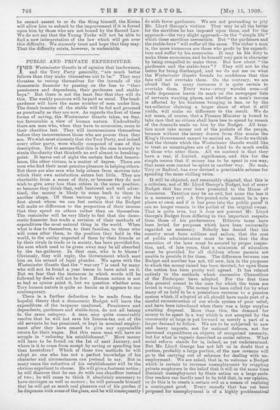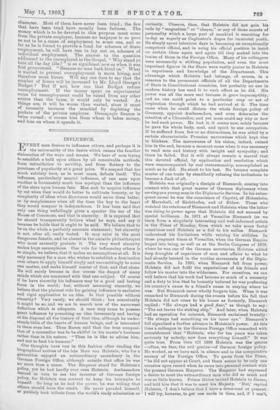PUBLIC AND PRIVATE EXPENDITURE. T HE Westminster Gazette is of opinion
that landowners, and the Tory Party generally, " are much better fellows than they make themselves out to be." They may threaten to recoup themselves for tho inroads of the democratic financier by passing on the loss to " their pensioners and dependents, their gardeners and stable- boys." But there is not the least fear that they will do this. The weekly pensions will be paid as usual. The head- gardener will have the same number of men under him. The dumb inmates of the stable will be fed and groomed as punctually as they are now. As regards the first of these forms of saving, the Westminster Gazette takes, we fear, too favourable a view of human nature. Undoubtedly there are men who, when they have to economise, come to their charities last. They will inconvenience themselves before they inconvenience those who are poorer than they are. We wish most sincerely that the Tory Party, and indeed every other party, were wholly composed of men of this description. But to assume that this is the case is surely to strain the charity that thinketh no evil almost to breaking- point. It leaves out of sight the certain fact that benevo- lence, like other virtues, is a matter of degree. There are men who find their most genuine pleasure in helping others. But there are also men who help others from motives into which their own satisfaction enters but little. They are charitable from a sense of duty, or because they do not wish to give away less than others in the same position, or because they think that, well bestowed and well adver- tised, the money is likely to come back to them in another shape. Of these various types, it is only the first about whom we can feel certain that the Budget, will make no difference to the proportion of their income that they spend on others rather than on themselves. The remainder will be very likely to feel that the demo- cratic financier has made a revision of their methods of expenditure the most natural thing in the world. When what is due to themselves, to their families, to those who will come after them, to the position they hold in the world, to the outlay expected of them by their friends or by their rivals in trade or in society, has been provided for, the sum which used to be given away may be all absorbed by the tax-gatherer. In that case, who is to blame ? Obviously, they will reply, the Government which sent him on his errand of legal plunder. We agree with the Westminster Gazette that the " war-cry " is used by. many who will not be found a year hence to have acted on it. But we fear that the instances in which words will be followed by deeds will not be few. Human nature is not so bad as cynics paint it, but we question whether even Tory human nature is quite so heroic as it appears to our contemporary.
There 'is a further deduction to be made from the hopeful theory that a democratic Budget will leave the expenditure of the taxpayer unaltered. Pensioners and dependents, gardeners and stable-boys, do not all belong to the same category. A man may quite conceivably resolve that he will not save his Income-tax out of the old servants he has pensioned, or kept in nominal employ- ment after they have ceased to give any appreciable return for their wages. But this same man will have no scruple in " reducing his establishment," More money will have to be found on the let of next January, and where is it to come from except by saving or spending less than heretofore? Which of these two methods he will adopt no one who has not a perfect knowledge of his character and circumstances can pretend to say. But in many cases the reduction of his establishment will be the obvious expedient to choose. He will give a footman notice ; he will discover that he can do with one chauffeur instead of two ; he will cease to think it absolutely necessary to have carriages as well as motors ; he will persuade himself that he will get as much real pleasure out of his garden if he dispenses with some of the glass, and he will consequently, do with fewer gardeners. We are not pretending to pity , Mr. Lloyd George's victims. They may be all the better for the sacrifices he has imposed upon them, and for the'. approach—the very slight approach—to the "simple life" which these sacrifices necessitate. But " the gardeners and the stable-boys " will suffer all the same. The richer a man' is, the more numerous are those who profit by his expendi; tuna and suffer by his economies. It may be his duty to make these economies, and lie himself may gain in character by being compelled to make them. But how about "the gardeners and the stable-boys" ? They will not be the better for being discharged, and we do not see on what the Westminster Gazette founds its confidence that this fate will not overtake them. On the contrary, we are afraid that in many instances it is quite certain to overtake them. Every wave—every wavelet even—of trade depression leaves its mark on the newspaper lists of servants wanting places, and whether a man's income is affected by his business bringing in less, or by the.
tax-collector claiming a larger share of what it still yields, will make no difference to the result. We do not mean, of course, that a Finance Minister is bound to take care that no citizen shall have less to spend by reason of the demands made on him by the Budget. All taxa- tion must take money out of the pockets of the people, because without the money drawn from this source the King's Government cannot be carried on. Nor do we think that the threats which the Westminster Gazette would like to treat as meaningless are of a kind to do much credit. to those who utter them. All we contend is that they have a real, if limited, significance, and this for the simple reason that if money has to be spent in one way, that same sum cannot be spent in another way. No man, Tory or Radical, has ever devised a practicable scheme for spending the same shilling twice.
It will be objected, and reasonably objected, that this is a criticism, not of Mr. Lloyd George's Budget, buit Of every Budget that has ever been presented to the House of Commons. Taxation may be an evil, but none the less it is a. necessary evil. A five-pound-note, cannot be iu two places at once, and if it has gone into the public purse it can no longer remain in the pocket of the original owner. That is quite true, but it does not prevent Mr. Lloyd. George's Budget from differing in two important respects from those of his predecessors. Hitherto taxes have been levied for purposes which have been universally regarded as necessary. Nobody has denied that the country must have soldiers and sailors, that the cost of public administration must be met, that the due execution of the laws must be secured by proper inspec- tion, and, of late years, that a minimum of education must be provided for all children whose parents are unable to provide it for them. The difference between one Budget and another has not, till now, lain in the purposes to which the money raised has been devoted, for upon these the nation has been pretty well agreed. It has related entirely to the methods which successive Chancellors of the Exchequer have adopted. For the first time this general assent to the uses for which the taxes are levied is wanting. The money has been called for by what many of us hold to be a premature recourse to a pension. system which, if adopted at all, should have made part of a careful reconstruction of our whole system of poor relief, and have been introduced when there was a large surplus awaiting disposal. More than this, the demand for money to be spent in a way which is not accepted by the community at large is put forward as merely a part of a larger demand to follow. We are to be subjected to new and heavy imposts, not for national defence, not for increased expenditure on objects of recognised necessity, but for what is vaguely described as social reform. What social reform stands for is, indeed, as yet undetermined. But Mr. Lloyd George has not left us in doubt that a portion, probably a large portion, of the new revenue will go to the carrying out of schemes for dealing with un- employment. We are asked, that is, to welcome a Budget which is certain to increase unemployMent by crippling private employers in the belief that it will at the same time diminish unemployment by State action on a large scale. Our readers can hardly need to be,told that, in our opinion, to do this is to create a certain evil as a means of realising a contingent good. Every remedy that has yet been proposed for unemployment is of a highly problematical
character. Most of them have never been tried ; the few that have been tried have usually been failures. The money which is to be devoted to this purpose must come from the private employer, because no taxpayer is so poor as not to be a cause of employment to some one, and so far as he is forced to provide a fund for schemes of State employment, he will have less to lay out on schemes of individual employment. The answer to the question addressed to the unemployed in the Gospel, " Why stand ye here all the day idle ? " is as significant now as when it was first pronounced. "Because no man bath hired us." What Is wanted to prevent unemployment is more hiring, and therefore more hirers. Will any one dare to say that the number of hirers will be increased by Mr. Lloyd George's Budget ? But if not, how can that Budget reduce unemployment. If the money spent on experimental cures for unemployment could be raised from any other source than the taxes, it would only be wasted. As things are, it will be worse than wasted, since it must of necessity increase the mischief by depleting the pockets of the private employer. Demagogic finance is twice cursed : it curses him from whom it takes money, and him on whom it spends it.











































 Previous page
Previous page